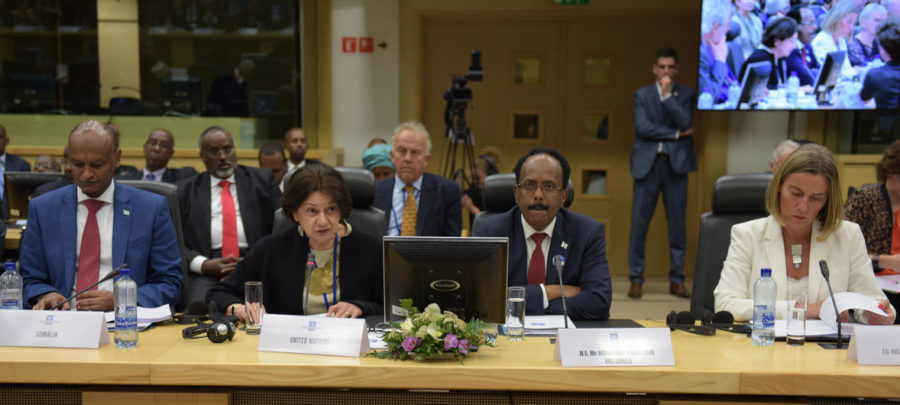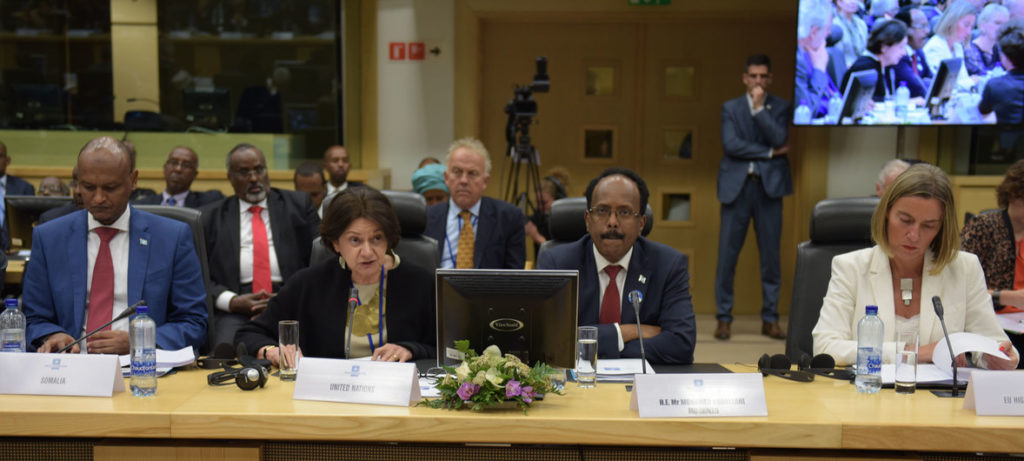Somalia Partnership Forum Issued No-confidence Communiqué in Brussels


By Mohamud M Uluso
The European Union (EU) and Swedish Government hosted the 2nd meeting of Somalia Partnership Forum (SPF) in Brussels, Belgium, on July 16-17, 2018, to assess the progress made for the implementation of the New Partnership for Somalia (NPS) and the Security Pact (SP) adopted at London Somalia Conference on May 11, 2017 and to agree on the work plan for the next 6-12 months. SPF is a structure established to legitimize the international intervention under Chapter VII of the UN Charter in Somalia in support of Somali owned and led peace and state building process. The synergy between International intervention and Somali ownership is key to real progress.
The 14 page Communiqué (C-SPF) of 81 points issued at the end of the two day meeting can be described as No–confidence statement of the International Partners (IP) of Somalia in the performance of the Federal Government of Somalia (FGS), which led to a “To-Do List” assignment.” Indeed, the central message of the Forum to the Somali leaders is “please take this “To Do List” assignment again for implementation in the next 6-12 months.” The FGS bungled the implementation of the year old NPS and SP principles and goals, particularly by flouting the practice of the rule of law, respect of human rights, good governance, transparency and accountability.
The opening speech of President Mohamed Abdullahi Farmajo did not provide account of the priorities agreed upon in London as well as significant specific verifiable accomplishments or obstacles faced. It was vague and lackluster. More pathetic, the Somali leaders did not show preparation, unity, coordination, and discipline during the meeting in Brussels. The most puzzling question is that the Somali leaders appealed for the assistance of democratic donors to use for undemocratic system.
The C-SPF speaks for the IP and commends, welcomes, and acknowledges 5-6 baby steps towards progress. The baby steps include 5% sales tax which brings in an additional one million dollar revenue per month, the cluttered Transition Plan for security transfer from African Union forces to Somali forces, rough draft agreements on revenue and resource sharing, opaque accord on 2020/2021 political election model, and preliminary fiscal and judiciary frameworks between the federal and state ministries. The baby steps did not go through legitimate and credible institutional processes and there are no public information available to corroborate the significance of the claimed progress. The C-SPF makes clear that the baby steps are easily reversible because of high persistent risks, weak institutions, and lack of accountability. For the rest, the C-SPF encourages the FGS to accelerate the implementation of the “To-Do List” assignment.
Despite the pledges of EU and Sweden government, the C-SPF did not mention financial pledge comparable to the 2013-2016 pledge of $ 2.8 billion. Meanwhile, the FGS has been advised to act for its own resource mobilization. The EU assistance of €3.7 billion provided for the period 2015-2018 and the paltry progress made with it represents a colossal failure that is exacerbating donor fatigue.
In contrast to the Somali leaders’ claim of shifting from humanitarian aid to development support, the C-SPF highlights the distressing statistics of the humanitarian crisis afflicting Somalia. 5.4 million People are in need of humanitarian assistance, 2.6 million of whom are Internally Displaced People (IDP) in need of various forms of assistance and protection, including protection from forced eviction by the FGS. The humanitarian crisis is above and beyond the suffering of the people for abuses of power and political ineptitude.
The C-SPF affirms the sovereignty, territorial integrity and unity of Somalia and the support for the reconciliation among Somali communities. However, Somaliland Administration (self-declared independent of Somaliland) did not participate in the SPF meeting. The Tukaraq conflict between Puntland and Somaliland administrations defines the territorial integrity, unity, and the federal system of Somalia. The new engagement of UN and IGAD should shed light on the underlying causes of the conflict and the way forward. Dialogue between FGS and Somaliland is fruitless.
Point 62 of the C-SPF confirms that the IP will support and empower the NGOs to deliver the services of the federal ministries and will explore new ways of working with all Somali local actors, including Somali private sector, local community based NGOs, and local authorities.” This is rejection of recommendations made by Dan Honig and Sarah Louise Cramer in their paper on “Strengthening Somalia Systems Smartly,” December 2017, for use of country system and supports the no confidence statement.
The C-SPF cites several new offices, namely the National Security Office (NSO), the Federalization Negotiation Technical Committee (FNTC), the Disaster Management Agency (DMA), National Security Council (NSC), and Regional Security Council (RSC). It is not clear the working relationship between these offices and other federal and state Institutions. Sprawling of offices, committees, and councils without legal foundations hampers state building and good governance.
The “To Do List” include, among many things, the completion and endorsement of permanent federal constitution by December 2018 (not December 2019) and realignment between State and federal constitutions; establishment of constitutional court and functional judicial service commission, human rights commission, and justice reform; passage of electoral law, amendment of political party law, decision on electoral model, voter registration, electoral districts, for “one-person-one-vote” election in 2020/2021; security sector reform with civilian oversight and compliance with human rights, creation of maritime force, and implementation of Transition plan; passage of anti-corruption commission for transparent and accountable public financial management.
Point 44 of the C-SPF clarifies that debt relief through Heavily Indebted Poor Countries (HIPC) process depends on the establishment of macroeconomic framework based on good governance, strong financial institutions, and clear economic policy. The World Bank made the same point in its Somalia Economic Update Report of October 2015. Somalia faces monumental challenges for debt determination and debt relief.
For obvious reasons, SPF gives lukewarm support to “currency reform initiative.” Point 52 of the C-SPF explains the political and economic purposes behind currency reform. Therefore, political reconciliation, national integration under rule of law, effective institutions, and solid macroeconomic framework are critical preconditions for currency reform.
The UN Security Council resolution 2431 of July 30, 2018 delayed the implementation of the drawdown of AMISOM forces planned in October 2018. The decision is further evidence for the no confidence outlook on the performance of the FGS. Similarly, the EU is facing new hurdles against supporting the security sector reform following the European Parliament resolution 2018/2782 criticizing the FGS’s poor human rights record. Again, this reinforces the no confidence judgement.
The reading of the JC-SPF raises serious concern and questions about the moral responsibility of the Somali authorities to serve first and foremost the interest of their country and people. The security forces of the Somali National Army (SNA) and National Intelligence and Security Agency (NISA) trained and supported by the International Partners to fight against terrorism and to protect the citizens, and the Judiciary system are now used to attack and intimidate the citizens and to suppress freedoms of expression and association. The creation of government militia like Mogadishu Stabilization Forces and Civil Defense Force (CDF) outside the Provisional Constitution and the brazen protection of security officials accused of human rights abuses are stirring political tensions and anarchism.
The leadership trust, cooperation, participation, transparency, persuasion and discipline needed in the complex negotiations and legislation for accomplishing the tasks of the “to do list” are in short supply. The federal parliament, other federal and state institutions, and the civil society are paralyzed and discredited through corruption and patronage.
Most probably, the incumbent leaders will continue to fail in implementing the “To-Do List” assignment because they are intensely and narrowly focused on their 2020/2021 reelection by hook or by crook rather than fulfilling responsibly and effectively the state building activities planned during their term in office 2017-2020. This is replay of failed 2012-2016 strategy. The Somali people are still looking for leaders who can be good example and heroes for honest competitive politics and service to the country.
The author can be reached through [email protected]